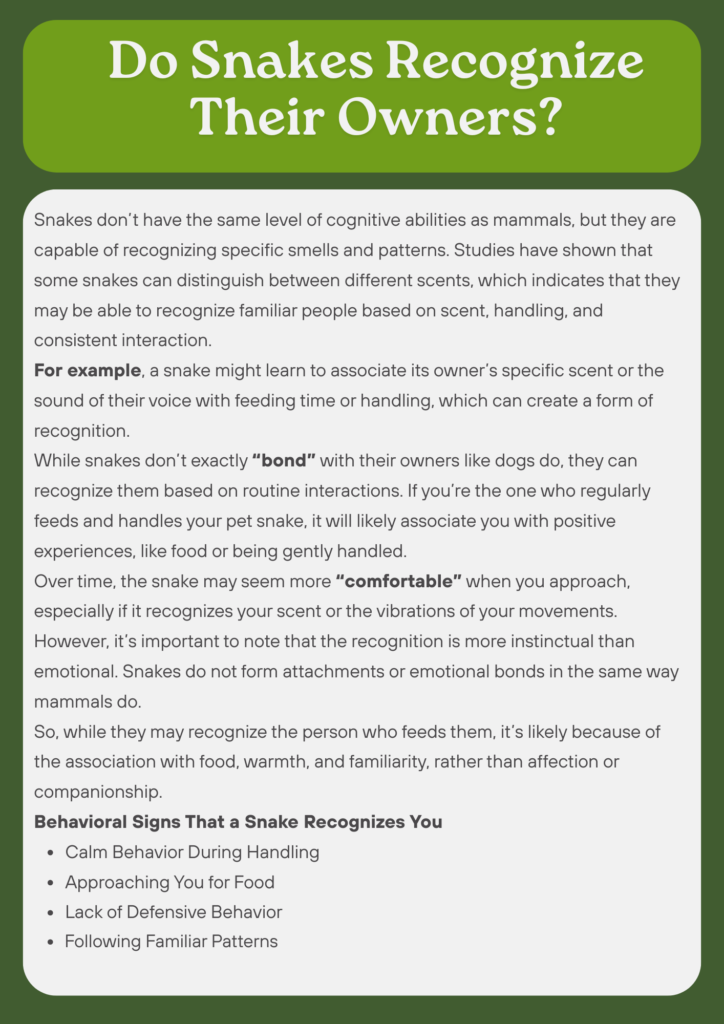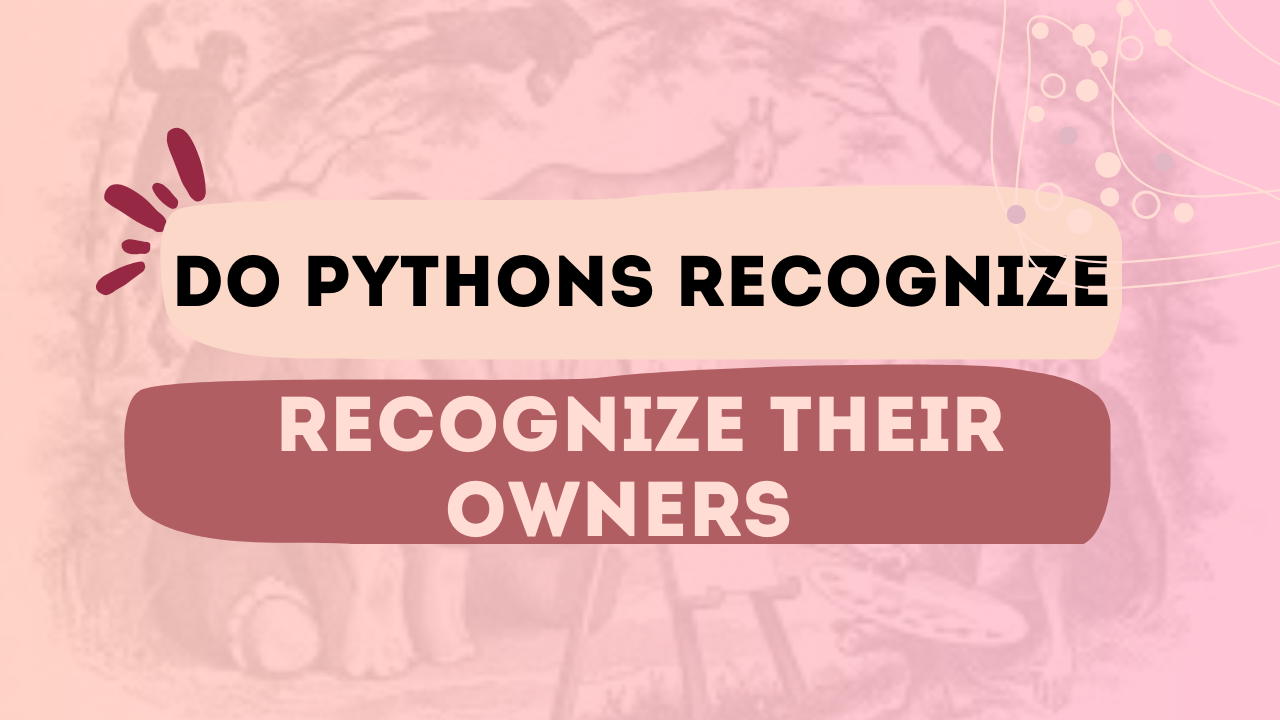When it comes to having a pet snake, one of the most common questions people ask is, Do Snakes recognize their owners? It’s a fair question considering the bond we form with more traditional pets like dogs, cats, or even birds, who seem to show affection and recognition towards their humans. But do snakes share this ability, or is it something entirely different with these slithering reptiles?
Table of Contents
Well, the short answer is: Sort of. Snakes do have the capacity to recognize their owners, but the way they do it is quite different from how a dog does its tail when it sees you.
Let’s dig into how snakes process their environment, whether they can form some kind of bond with their owners, and what recognition looks like in the world of reptiles.
How Do Snakes Perceive the World?
Before jumping into whether or not snakes can recognize their owners, it’s important to understand how snakes perceive the world around them. Unlike mammals, snakes don’t have the same sensory input when it comes to sight or smell.
Instead, snakes rely heavily on their sense of smell and vibrations to interact with their environment. Their most prominent sense is their highly developed ability to “smell” the world using their forked tongue.
This allows them to pick up chemical cues from the air and the ground, helping them detect prey, predators, and even familiar humans.
In the wild, snakes use their keen sense of smell to track down food, avoid threats, and find mates. In captivity, this sense of smell is still active, and they may use it to “know” who’s handling them.
However, it’s not quite the same as the way a dog or cat uses sight and sound to interact with people. With that in mind, let’s explore how this translates to recognizing their owners.

Can Snakes Recognize Their Owners?
Snakes don’t have the same level of cognitive abilities as mammals, but they are capable of recognizing specific smells and patterns. Studies have shown that some snakes can distinguish between different scents, which indicates that they may be able to recognize familiar people based on scent, handling, and consistent interaction.
For example, a snake might learn to associate its owner’s specific scent or the sound of their voice with feeding time or handling, which can create a form of recognition.
While snakes don’t exactly “bond” with their owners like dogs do, they can recognize them based on routine interactions. If you’re the one who regularly feeds and handles your pet snake, it will likely associate you with positive experiences, like food or being gently handled.
Over time, the snake may seem more “comfortable” when you approach, especially if it recognizes your scent or the vibrations of your movements.
However, it’s important to note that the recognition is more instinctual than emotional. Snakes do not form attachments or emotional bonds in the same way mammals do.
So, while they may recognize the person who feeds them, it’s likely because of the association with food, warmth, and familiarity, rather than affection or companionship.
Behavioral Signs That a Snake Recognizes You
If you’re wondering whether your snake recognizes you, there are a few behavioral clues to look for. Here are some common signs that suggest your snake might be familiar with you:
- Calm Behavior During Handling: If your snake remains calm when you handle it regularly, it might be recognizing your scent or movements. An unfamiliar person or handler might cause the snake to become more defensive or stressed. If it relaxes in your hands, this may be a sign that it feels comfortable with you.
- Approaching You for Food: Snakes that recognize their owners may approach them more readily during feeding time. Since snakes are very instinct-driven when it comes to food, if they come towards you or become more active when they see you, it could be because they associate you with their food source.
- Lack of Defensive Behavior: Wild snakes are often very defensive and can be quick to strike if they feel threatened. However, pet snakes that recognize their owners might be less defensive, especially if they have been conditioned to see you as a non-threatening presence. If your snake seems less likely to strike or coil up defensively around you, this could indicate recognition.
- Following Familiar Patterns: Some snakes learn specific routines. For example, they might recognize the sound of a specific door opening or the rattle of a food bowl being placed. If your snake is consistently active or alert when you perform certain tasks, like feeding or cleaning the enclosure, it might be recognizing the pattern rather than you specifically.
Do Snakes Experience Attachment or Affection?
While snakes can recognize their owners, it’s essential to note that they don’t form emotional bonds like dogs or cats. Snakes are solitary creatures and, as cold-blooded animals, they have different behavioral needs. They do not seek social interactions or affection in the same way mammals do. For snakes, interactions with humans are more about survival—food, comfort, and safety than emotional connection.
That said, there are some cases where a snake may appear to enjoy regular handling or become more comfortable around their owner over time. This is more about the snake being conditioned to trust the person who feeds and cares for it rather than a deep emotional attachment.
Can Snakes Learn Commands?
While snakes do not have the cognitive ability to learn tricks or commands like dogs or birds, they can be conditioned to recognize certain cues.
For example, if you consistently associate a specific noise, such as the sound of a feeding dish, with food, your snake will likely learn to react to that cue.
Snakes can also recognize patterns, so they might respond to familiar situations—such as when their enclosure is being opened, indicating it’s feeding time.
However, this type of “learning” is more instinctual and based on repetition rather than a deep understanding of human commands.
Conclusion
In conclusion, snakes do have the ability to recognize their owners, but it’s important to remember that this recognition is very different from what we might expect from more traditional pets.
Snakes primarily recognize their owners through scent, routine, and familiar patterns. They may feel more comfortable with their owners over time, especially if they associate them with positive experiences like food or safety.
However, snakes do not form emotional attachments or bonds like dogs or cats, and their recognition is more about familiarity and instinct rather than affection.
So, while your snake may recognize you and react to you in ways that suggest familiarity, don’t expect the kind of bonding that is often seen with other pets. Snakes are fascinating creatures, and their form of recognition is just one of the many unique traits that make them special.

